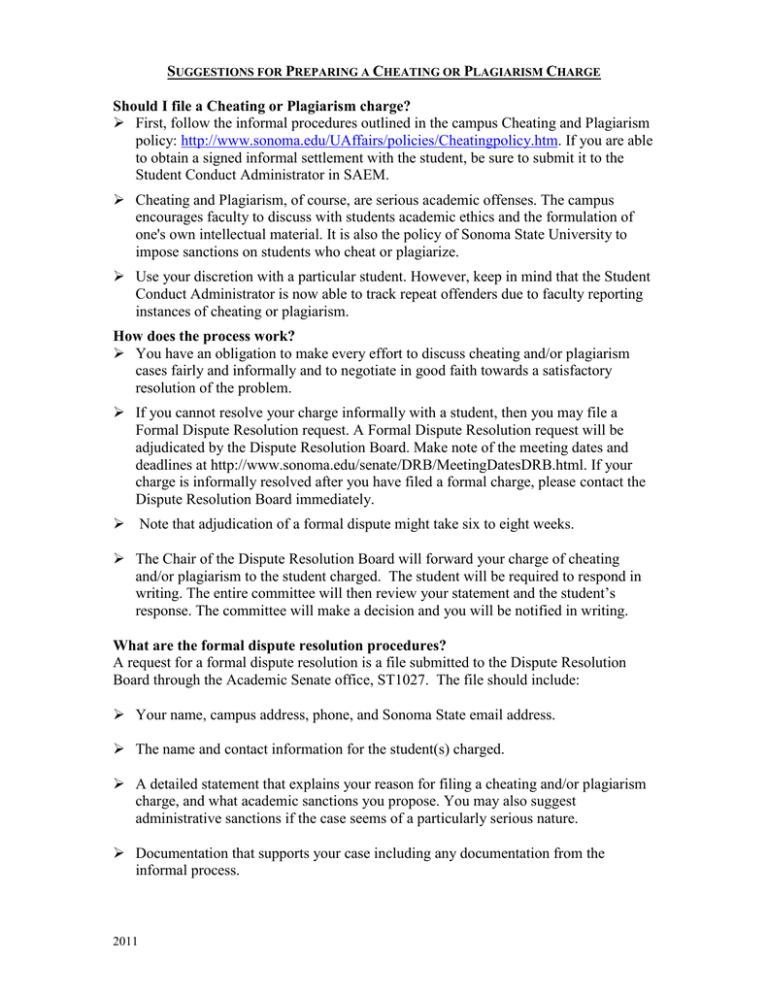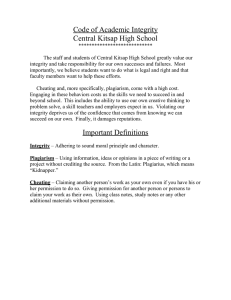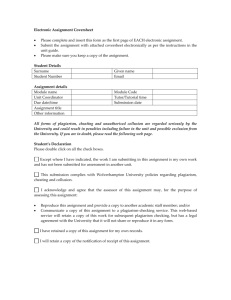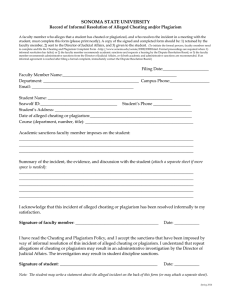Filing a Formal Cheating and/or Plagiarism charge
advertisement

SUGGESTIONS FOR PREPARING A CHEATING OR PLAGIARISM CHARGE Should I file a Cheating or Plagiarism charge? First, follow the informal procedures outlined in the campus Cheating and Plagiarism policy: http://www.sonoma.edu/UAffairs/policies/Cheatingpolicy.htm. If you are able to obtain a signed informal settlement with the student, be sure to submit it to the Student Conduct Administrator in SAEM. Cheating and Plagiarism, of course, are serious academic offenses. The campus encourages faculty to discuss with students academic ethics and the formulation of one's own intellectual material. It is also the policy of Sonoma State University to impose sanctions on students who cheat or plagiarize. Use your discretion with a particular student. However, keep in mind that the Student Conduct Administrator is now able to track repeat offenders due to faculty reporting instances of cheating or plagiarism. How does the process work? You have an obligation to make every effort to discuss cheating and/or plagiarism cases fairly and informally and to negotiate in good faith towards a satisfactory resolution of the problem. If you cannot resolve your charge informally with a student, then you may file a Formal Dispute Resolution request. A Formal Dispute Resolution request will be adjudicated by the Dispute Resolution Board. Make note of the meeting dates and deadlines at http://www.sonoma.edu/senate/DRB/MeetingDatesDRB.html. If your charge is informally resolved after you have filed a formal charge, please contact the Dispute Resolution Board immediately. Note that adjudication of a formal dispute might take six to eight weeks. The Chair of the Dispute Resolution Board will forward your charge of cheating and/or plagiarism to the student charged. The student will be required to respond in writing. The entire committee will then review your statement and the student’s response. The committee will make a decision and you will be notified in writing. What are the formal dispute resolution procedures? A request for a formal dispute resolution is a file submitted to the Dispute Resolution Board through the Academic Senate office, ST1027. The file should include: Your name, campus address, phone, and Sonoma State email address. The name and contact information for the student(s) charged. A detailed statement that explains your reason for filing a cheating and/or plagiarism charge, and what academic sanctions you propose. You may also suggest administrative sanctions if the case seems of a particularly serious nature. Documentation that supports your case including any documentation from the informal process. 2011 SUGGESTIONS FOR PREPARING A CHEATING OR PLAGIARISM CHARGE Note that if administrative sanctions are suggested, the Dispute Resolution Board will decide 1) if they are appropriate kinds of administrative sanctions and 2) if they will forward the recommendation to the Student Conduct Administrator for further action. Any advice on preparing a formal dispute resolution file? Keep your statement simple. State what happened without adding your opinions. Be as specific as possible. For example, “I found this paper as turned in word for word on X website (list URL). Avoid inflammatory remarks, such as, “This student is a constant problem in class.” Don’t include arguments that are not grounds for a cheating and/or plagiarism charge. They will distract the committee from the more significant arguments. Your statement should explain how to interpret the documentation that you include. It is helpful to the committee for you to include explanations such as, “The emails I present demonstrate the unwillingness of the student to meet with me informally.” Where can I get more information? The Cheating and Plagiarism Policy is online at http://www.sonoma.edu/UAffairs/policies/Cheatingpolicy.htm The Formal Dispute Resolution Procedures are online at: http://www.sonoma.edu/UAffairs/policies/dispute_resolution.htm You may also discuss your case with the Chair of the Dispute Resolution Board (see http://www.sonoma.edu/Senate/Commems/sacsubcommittees.htm) or the Academic Senate Analyst, 664-2801. 2011


